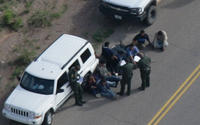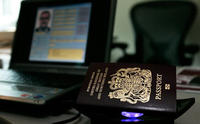-
Court rejects expedited handling of Arizona's appeal of injunction
In a second set back to Arizona’s tough immigration law, the U.S. Court of Appeals for the Ninth Circuit denied Arizona governor Jan Brewer’s motion seeking expedited handling of the Arizona’s appeal of Judge Susan Bolton’s preliminary injunction enjoining enforcement of many provisions of Arizona’s controversial immigration law
-
-
Arizona appeals injunction which blocked major parts of new immigration law
Citing “the State of Arizona’s right to implement a law its Legislature enacted to address the irreparable harm Arizona is suffering as a result of unchecked unlawful immigration,” the appeal claims only one issue, “whether the district court relied on an erroneous legal premise or abused its discretion” in granting the preliminary injunction
-
-
Arizona's new immigration law in effect tomorrow; degree of federal cooperation unclear

Arizona tough immigration law goes into effect tomorrow; it is not clear to what extent the Immigration and Customs Enforcement (ICE), the U.S. immigration enforcement agency, will cooperate with police who are trying to enforce it; ICE officials said they are waiting to see whether the law survives court challenges, contending that the law is unconstitutional and could lead to racial profiling; there is a history of cooperation between ICE and Arizona law enforcement: the agency has signed so-called 287(g) agreements with nine law-enforcement agencies in Arizona that either allow local officers to enforce federal immigration laws or allow jail officials to identify illegal immigrants booked into jails to be processed for deportation
-
-
Climate change could intensify Mexican migration to U.S.: study
A study published in the Proceedings of the National Academy of Sciences argues that global warming could drive millions more Mexicans into the United States in search of work by 2080 due to diminishing crop yields in Mexico; a 1.8 to 5.4 degrees Fahrenheit increase in temperature by 2080, unless agricultural methods have been adapted, would mean crop yields in Mexico would fall by 39 to 48 percent
-
-
The revival of CLEAR's Registered Traveler program
In 2003, Steven Brill, founder of Court TV and American Lawyer magazine, founded Verified Identity Pass and used it to launch the CLEAR program at Orlando International Airport; the program made it possible for pre-registered travelers to skip security checks at airports; the initial 8,000 travelers enrolled in 2003, and the service would grow to nearly 260,000 paying customers in a matter of five years; CLEAR went belly up in 2009, and its assets were bought by Algood Holdings, which relaunched the program; “Same brand, same logo, different company,” says CEO Caryn Seidman Becker
-
-
GAO: U.S. aid to Mexico's anti-drug efforts needs better oversight
Under the Obama administration, the focus of the Merida Initiative is shifting away from high-priced helicopters and airplanes and toward reforming Mexico’s corrupt law enforcement, courts and other government institutions
-
-
Federal money to bolster crime-fighting capabilities of Arizona border counties
Governor Jan Brewer allocates up to $10 million in federal stimulus money to help law enforcement pay for costs associated with illegal immigration, including drug trafficking and human smuggling; funds will buy satellite phones, SUVs, night-vision scopes, thermal imagers and weapons
-
-
U.K. removes lead contractor Raytheon from e-Borders program

The U.K. hits out at Raytheon, removing the company from the £1.2 billion e-Borders program; the immigration minister Damian Green said earlier today that the program was running at least twelve months late and that Raytheon had been in breach of contract since July last year; Home Office says it has “no confidence” in the company; Raytheon was the lead contractor of the Trusted Borders consortium, which won a £650 million deal in 2007 to build the e-Borders system; other members of the consortium, including Serco, Detica, Accenture, and Qinetiq will keep their contracts; Raytheon was responsible for systems integration, travel services, and overall project management
-
-
Explosives car in Mexican drug war the beginning of a trend
Security experts fear that last Thursday car bombing in Ciudad Juárez, across the border from El Paso, is the beginning of deadly trend which will see a weapon used regularly —and effectively — by insurgents and militants in Iraq, Afghanistan, Pakistan, and elsewhere soon making its presence felt on the streets of Mexico
-
-
EU biometric passports not that safe, experts say
The EU’s e-passports were supposed to be fool-proof, even impossible to counterfeit; Europol has warned, though, that despite the biometric changes to passports, counterfeiting still remains a major problem for criminals or others “who are determined to do so,” with the provision of documents for irregular immigrants being the main driver of the activity
-
-
Armed escorts to accompany New Mexico livestock inspectors
Beginning on 26 July, armed deputies will accompany inspectors to the scales in a corridor that stretches southwest from Interstate 10 at Las Cruces to the New Mexico-Arizona border, along Luna, Hidalgo, and Grant counties; the sense of insecurity among ranchers along the border has increased since the highly-publicized 27 March murder of Arizona rancher Robert Krentz
-
-
Remotely controlled mechanical watch towers guard hostile borders
South Korea has began to install unmanned guard towers, equipped with sensors and machine-guns, along the DMZ; The South Korean military is emulating the system Israel has built around the Gaza Strip — a system of unmanned, armored towers, about five meters (sixteen feet) tall and two meters (six feet) in diameter; at the top of the tower is an armored shelter that conceals a remotely controlled machine-gun; operators control the surveillance and weapon systems atop these towers from a remote central command-and-control location
-
-
FBI, ATF aid in inquiry of Mexico's first IED attack
Car bombs have been used by terrorists and guerrilla groups in the Middle East, Ireland, Spain, and Colombia — but, until last Thursday, not in Mexico; the Juárez bombing involved an elaborate scheme — the perpetrators dressed a man in a police uniform and laid him on the ground to lure others to the body; the explosion occurred right after a paramedic and a federal agent approached the body; the bombing was part of a brutal war drug cartels have been waging to control the Chihuahua state drug smuggling corridor that has claimed more than 1,500 lives so far this year
-
-
Neo-Nazi militia patrols Arizona desert
Various volunteer-based groups patrol the Arizona desert and report suspicious activity to the Border Patrol, and generally they have not caused problems; Arizona law enforcement authorities are worried about the latest addition: a local neo-Nazi militia; members of the militia are outfitted with military fatigues, body armor, and assault rifles — and openly proclaim that only non-Jewish, white heterosexual people should be American citizens and that everyone who is not white should leave the country — “peacefully or by force”
-
-
Soaring immigrant deaths in Arizona desert in July
The number of deaths among illegal immigrants crossing the Arizona desert from Mexico is soaring so high this month that the medical examiner’s office that handles the bodies is using a refrigerated truck to store some of them, the chief examiner said Friday
-
- All
- Regional
- Water
- Biometrics
- Borders/Immig
- Business
- Cybersecurity
- Detection
- Disasters
- Government
- Infrastructure
- International
- Public health
- Public Safety
- Communication interoperabillity
- Emergency services
- Emergency medical services
- Fire
- First response
- IEDs
- Law Enforcement
- Law Enforcement Technology
- Military technology
- Nonlethal weapons
- Nuclear weapons
- Personal protection equipment
- Police
- Notification /alert systems
- Situational awareness
- Weapons systems
- Sci-Tech
- Sector Reports
- Surveillance
- Transportation
Advertising & Marketing: advertise@newswirepubs.com
Editorial: editor@newswirepubs.com
General: info@newswirepubs.com
2010-2011 © News Wire Publications, LLC News Wire Publications, LLC
220 Old Country Road | Suite 200 | Mineola | New York | 11501
Permissions and Policies
Editorial: editor@newswirepubs.com
General: info@newswirepubs.com
2010-2011 © News Wire Publications, LLC News Wire Publications, LLC
220 Old Country Road | Suite 200 | Mineola | New York | 11501
Permissions and Policies
